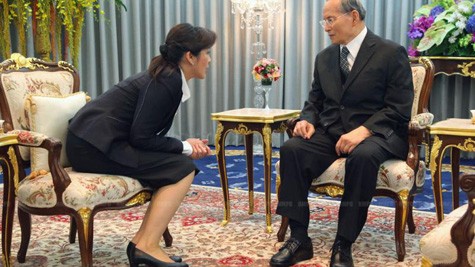(VOVworld) – Thailand has faced serious instability since the bloody crackdown on protesters in 2010. Street protests killed 4 people and injured hundreds. Police have had to use tear gas and water cannons to repel protesters.
On Monday, the Thai Criminal Court ordered the arrest of former senator Suthep Thaugsuban, who is the leader of the current street protests in Bangkok. Suthep has led thousands of protesters to besiege a number of ministry buildings in the capital. Suthep, one of the 4 leaders of the Network of Students and People for Reform of Thailand was accused of breaking into and destroying the headquarters of state agencies. Earlier, he released an ultimatum giving Prime Minister Yingluck Shinawatra 2 days to return power to the people. The government immediately rejected this demand, calling it unconstitutional.
Portrayal of the opposition leader
Suthep was Deputy Prime Minister from 2008 until 2011. He served in the government that ordered the crackdown on supporters of ousted Prime Minister Thaksin Shinawatra in 2010, which killed more than 90 people. Suthep has had great influence in the Democrat Party for many decades and he used to be Minister of Agriculture and Minister of Telecommunications. When Yingluck was elected Prime Minister, Suthep became a leader of the opposition. He left the Democrat Party to become a protest leader immediately after Prime Minister Yingluck proposed the Amnesty Bill. Determined to uproot the government led by Thaksin’s sister, Yingluck, Suthep has called for the government to be replaced by an unelected People’s Council.
Political motivation
Thailand’s political arena has witnessed frequent confrontations through street protests between Thaksin supporters and opponents, the red shirts and the yellow shirts. Pro-Thaksin factions have won in all elections since 2001 and the only way the opposition could regain power would be to conduct a coup. The Amnesty Bill, say observers, is an excuse for the yellow shirts to topple the government.
Could mildness win over firmness?
Moderate Yingluck has said she remains open to negotiations and that she would apply any measure that could restore peace. The government has pledged restraint and to use moderate, legal measures to deal with the protests. In a televised address, Yingluck said she would not authorize the use of force against protestors. Observers say that Yingluck’s government has learned from the events of 2010 and does not want to make the same mistake. However, the government could fall into the same trap as 2008 when protestors occupied public offices, paralyzing the administrative system.
Observers continue to argue over the future of the Thai government. Political tensions could be pushed to a level that the government cannot handle and a military coup would be likely as it has become familiar to the Thai people. King Bhumibol’s 86
th birthday on Thursday is expected to ease tensions in Thailand as it is an occasion respected and honored by all people and factions. However, this could be a lull before a new storm hits Thailand.

Prime Minister Yingluck and King Bhumibol
|